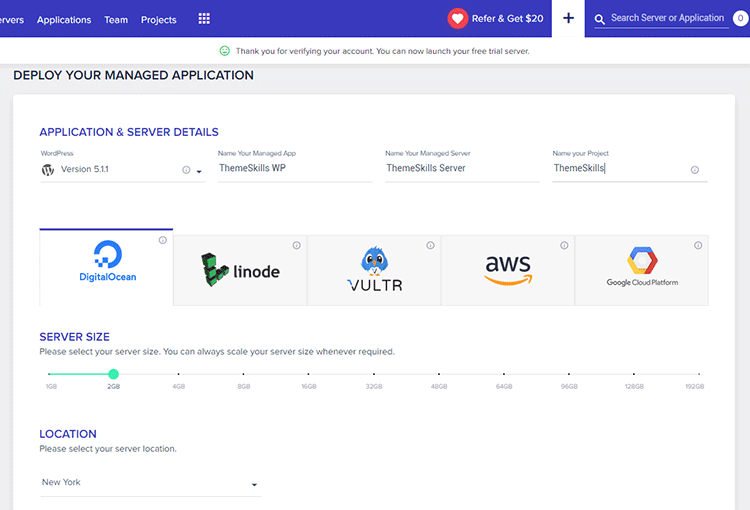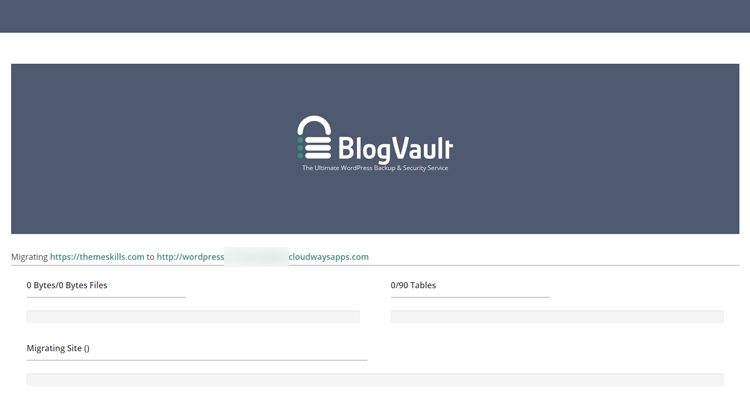
I recently migrated this site to Cloudways from SiteGround, which was a sad thing to do because I really like SiteGround! I had a great experience with them over the past 4 years. I still have my other blog there, though.
You can read my SiteGround WordPress hosting review for more details.
The main reason I moved was my not-so-bright budget. My hosting plan was about to expire, and I also would have needed to upgrade to GoGeek, which would have cost me nearly $500 in one shot.
The other reason was that I didn’t want to be in a shared environment anymore, and their cloud hosting was over my budget as well.
So, after a couple of days of research, I decided to go with Cloudways!
So far, it was a good decision, as you’ll see in this Cloudways hosting review for WordPress.
2. Main features (i.e. performance, security, monitoring, and more)
3. TTFB (Time to first byte)
4. Launching a server with WordPress
5. Migrating a WordPress site
6. Customer support
7. Pricing
8. Pros and cons
If you want to buy Cloudways, use this link and add the coupon code THEMESKILLS to get 10% OFF for 3 months!
What is Cloudways and How Does It Work?
Cloudways is a managed cloud hosting platform, but they don’t offer the hosting environment themselves.
Depending on what you choose, your WordPress website will be hosted on a server on DigitalOcean, Linode, Vultr, Google Cloud Platform, or Amazon Web Services.

Cloudways is like the middle-man/intermediary between you and the cloud hosting provider.
Why do you need that?
Well, if you go straight to those cloud hosting providers, you’ll have to configure, secure, and optimize the server yourself.
Basically, you’ll need to have the knowledge of a System Administrator. Besides that, you’ll also need to know how to properly configure the server for WordPress in particular.
It can be REALLY nerve-racking.
So, that’s where Cloudways hosting comes in. Their platform is like your System Administrator.
Everything will be automatically configured, secured, and optimized for different applications, including WordPress.
If you need to change some settings after everything’s deployed, you don’t need to write lines of code for the server, you just go in your control panel and modify what you need.
Going straight to the cloud hosting provider will be cheaper, but if you don’t have sysadmin knowledge, you’ll be spending the money that you saved on painkillers for your headaches, trust me!
I like learning new stuff and do things on my own, but even I didn’t want to go through all that.
Cloudways Hosting Features
Cloudways applies best practices when it comes to servers and applications. They use all the good stuff.
If you’re a bit of a techie, you’ll know about some or all of the things I’ll point out below.
I won’t go through all of the features because they are a ton. I’ll point out the ones I consider to be the most important.
Dedicated environment
You don’t have to share the server’s resources with someone else’s website, as you do on shared hosting plans.
You also don’t have the limitations that you have on a shared environment, such as not being able to increase your memory limit, upload size, max input time, and so on.
Uses both Apache and Nginx
Apache and Nginx are server software. Like Windows or macOS is for your PCs.
Using Apache with Nginx (Nginx as a reverse proxy and Apache in the back-end) is the best practice when it comes to WordPress.
Nginx is faster, but Apache is more flexible and easier to work with. This combination allows WordPress to benefit from Nginx’s performance while still making use of Apache’s .htaccess file, which can be necessary for some plugins.
Also, if you’ve been searching for WordPress tutorials, you probably have bumped into some that tell you to add some code in the .htaccess file.
It’s a very rare thing to find those codes for Nginx’s nginx.conf file as well. I don’t add them in my tutorials either because I don’t know them.
So, if you’d only be running on Nginx, it would be harder to find information.
Great caching systems to improve performance/loading time
They have:
- Redis;
- Memcached;
- Varnish;
- OPcache;
- Breeze, which is their own caching plugin. Cloudways is also compatible WP Rocket (review), though, if you want to use that. I’m using it.
Note that Redis is not enabled by default.
Pre-configured PHP-FPM
Since WordPress is written using the PHP programming language, PHP-FPM is really useful because it improves the performance of the PHP environment.
Security
Security is also strong:
- Dedicated firewalls at OS-level, which protect you from malicious traffic;
- Regular OS security patching and firmware upgrade;
- Free Let’s Encrypt SSL certificate to serve your WordPress website over HTTPS, not HTTP;
- SSH and SFTP access.
Automatic and manual backups
You can choose to have your WordPress site backed up automatically, but you can also back it up manually whenever you want.

Monitoring
You’ll get many detailed statistics regarding your server and resources. Here are several of them:
- RAM, disk, bandwidth, and CPU usage;
- Reads and writes per second;
- Incoming and outgoing network traffic;
- Memcached and Varnish hit rate.


CDN (Content Delivery Network)
If you get global or regional traffic, not only from one country/state/city, then adding a CDN can greatly improve your WordPress site’s performance.
Cloudways offers CDN at $1 per 25 GB per application. The CDN provider is StackPatch, who bought MaxCDN.
If you’re using Cloudflare instead, it won’t be an issue. Just make sure you select it in Servers > Server Management > Settings and Packages > Advanced > WAF Module, so you can prevent 127.0.0.1 showing instead of the users’ real IP.
Adding team members
This is another awesome feature.
You can add members with different roles and permissions to your chosen application or server.

This is also helpful if you hire a web developer for a one-time gig, for example, and you don’t want to allow them access to everything.
Useful add-ons
Cloudways hosting also provides some useful add-ons for extra features:
- DNS Made Easy to use DNS services.
- Rackspace Email for email hosting.
- Elastic Email for outgoing email delivery.
- Application Migration to request an application migration.
- Application Upgrade to upgrade your application.
- CloudwaysCDN to check which application is bound to the CDN.

User-friendly control panel with many settings
The Cloudways control panel is filled with settings and very easy to navigate.
I actually didn’t expect to have so many options available. They also listen to their customers’ requests and add more settings.
You basically have two control panels: one for your Application(s) (WordPress in our case) and one for the Server(s).
These are the main settings for your Server:

- Master Credentials – holds your SFTP and SSH access details.
- Monitoring – shows statistics about your server and resources.
- Manage Services – shows the core services that allow your application to work properly (e.g. Apache, Nginx, MySQL, etc.).
- Settings & Packages – settings that handle things like memory limit, upload size, execution limit, PHP and MySQL versions, and a lot more. They’re pretty technical, so I recommend seeking help if you don’t know what you’re doing there.
- Security – allows you to whitelist IPs for SSH/SFTP and MySQL. You should add it because you can get locked out if you input the wrong credentials several times.
- Vertical Scaling – allows you to upgrade your server by adding more resources (e.g. upgrade to 4 GB RAM).
- Backups – set automatic backups for your server, or create backups manually.
- SMTP – configure an SMTP service for outgoing email delivery. You can add your own or use Elastic Email, which is an add-on that you can install from Cloudways.
These are the main settings for your Application(s):

- Access Details – holds your access details for WordPress and database. You can also access your database from there.
- Disk Usage – shows the size of your application, files, and database usage (e.g. 2 GB).
- Domain Management – allows you to add your primary and additional domains (i.e. subdomains).
- Cron Job Management – allows you to easily add a Cron Job using PHP, cURL, or Wget. I recommend replacing WordPress cron with a real cron job from Cloudways. Go with the Wget type.
- SSL Certificate – provides free Let’s Encrypt SSL certificates for your domain(s).
- Restore – restore a backup of your files and database.
- Deployment Via Git – useful if you’re using Git repositories.
- Application Settings – allows you to change general settings (i.e. rename folder and web root, disable Varnish, reset folder permissions to default, and more), PHP-FPM settings, and Varnish caching settings.
- Migration Tools – allows you to download their migration plugin.
- CloudwaysCDN – configuration page for their CDN, which I mentioned above.
Cloudways TTFB
Usually, I don’t get into website speed when reviewing web hosts or themes because it depends on what tools you use on your WordPress website, how it’s optimized, and so on.
But, what I did notice is that the TTFB (Time to first byte) dropped by around 200 ms since I moved to Cloudways hosting. And I’m also using Cloudflare, which is known to increase the TTFB.

On SiteGround, it was higher.

But, of course, on SiteGround, I was on a shared hosting environment.
It’s normal for a good cloud hosting to be better than a shared hosting. This is more of a cloud vs shared hosting comparison.
So, the TTFB is really good on Cloudways (plus the Digital Ocean provider)!
Note that the TTFB depends on your site’s optimization as well, not only on the WordPress hosting!
Deploying a Server with WordPress
Deploying a server with WordPress is a matter of a few clicks and waiting a few minutes.
After you create your account – which is free for 3 days so you can check things out – you just need to add some server and application details, such as choosing the application (WordPress in this case), naming the server and app, and choosing the server’s location and size.

After that, you can proceed with pointing a domain to Cloudways and whatever else is necessary to go live. They have a lot of guides to help you out.
Migrating a WordPress Website to Cloudways
If you already have a WordPress site and want to migrate it, then that will be very easy as well!
You can either ask them to migrate it for you for free, or you can do it yourself by deploying the server and WordPress application, and then using their Cloudways WordPress Migrator plugin.

I used their plugin and did it myself.
If you want to do it yourself, too, then check out my step-by-step guide on how to migrate your WordPress website to Cloudways. I also mentioned several fixes for some issues that you might bump into.
Customer Support
24/7 live chat and ticketing
So far, the support has proved to be helpful and knowledgeable.
I had several minor issues and questions after the migration, so I contacted them several times via live chat and once via ticket.
They managed to help me and solve the issues pretty quick.
The waiting time on their live chat can vary from 2 to 5 minutes. I never waited more.
For a ticket reply, you’ll have to wait longer:
- Up to 3 hours for a “High Priority” ticket.
- Up to 12 hours for a “Normal Priority” ticket.
This is mentioned in the support email as well:

That was pretty hard for me because I was used to SiteGround’s 15-minute maximum response time for tickets.
They replied to my ticket in 3 hours and 24 minutes. I guess it’s decent…
Strong knowledge base
Cloudways does have a very good knowledge base with a lot of comprehensive guides.
They helped me A LOT when migrating my WordPress site.

Community forum
Cloudways also has a large and active community forum where you can ask for help or read guides and tips.

Pricing

The price for a WordPress hosting on Cloudways depends on what provider you use.
Digital Ocean, Linode, and Vultr are affordable, and the current starting prices are between $10/mo and $13/mo.
Google Cloud Platform currently starts at $33.30/mo and Amazon Web Services currently starts at $36.51/mo.
These two become more expensive on the next plans. They also offer very little bandwidth (2 GB), no matter the plan.
If you use more – and you most likely will if you don’t have very low traffic – you’ll have to pay as you go for more bandwidth.
You can see the prices and details here.
I went for the DO2GB plan from Digital Ocean, which is $22/mo. I chose Digital Ocean as the provider because I worked with it on a project and I know it’s good, optimized, and stable.
So, if you’re on a budget, I strongly recommend it. It’s a solid choice.
Pros and Cons
So far, I have a lot more pros than cons for Cloudways hosting.
Pros:
- Well configured and optimized;
- Follows best practices;
- Secure;
- You can deploy a server and WordPress with a few clicks and within minutes;
- Offers a lot of settings for your server and application;
- User-friendly control panel;
- Good customer support, strong knowledge base, and active community;
- Performance and quality at affordable prices.
Cons:
- The waiting time for a ticket reply is quite high;
- The .htaccess and wp-config.php files get replaced with default ones after a migration (using the plugin). This should be fixed or at least specified somewhere.
Conclusion for My Cloudways Hosting Review for WordPress
Am I happy with the choice I made? Yes, I am!
Has Cloudways proved to be a good and optimized managed hosting solution for WordPress, without breaking the bank? Yes, it has!
Do I recommend Cloudways? Yes, I do!
So, if you’re thinking of choosing Cloudways to host your WordPress site, I say go for it!
That’s a Wrap
I hope you found this Cloudways hosting review for WordPress useful, and you managed to see if it will be a good solution for you or not.
If you have any questions or thoughts, drop a comment or send a message via contact or Facebook page.
You can also hit the follow button on Twitter and subscribe to the YouTube channel.
Don’t forget to share the post to help out others!


Leave A Comment